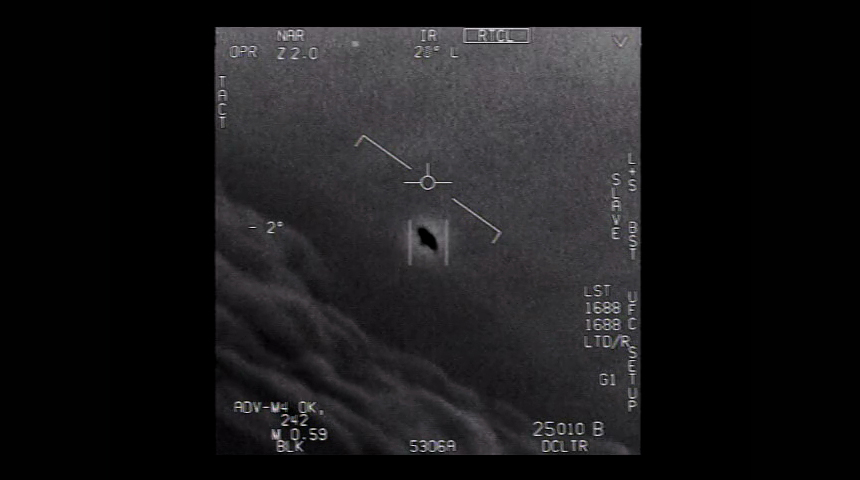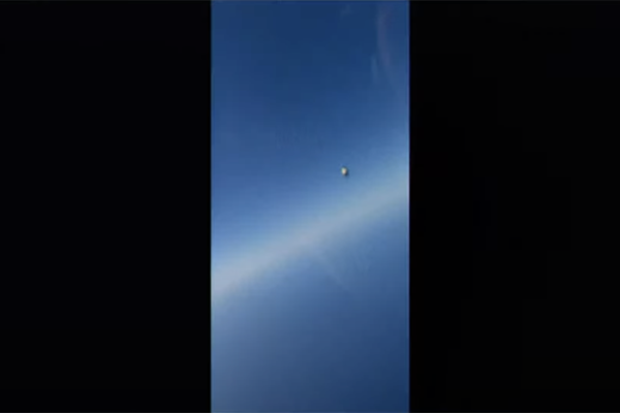Footage of bizarre metallic UFO shown by Pentagon officials at historic hearing
UFO sightings are "frequent and continuing," Pentagon officials said.

Pentagon officials speaking at the first public hearing on UFOs since the 1960s have shown previously classified footage of an unidentified aerial phenomenon (UAP), a split-second video of a metallic sphere zooming across the flight path of a military jet.
The object, captured through the cockpit window of an FA-18 fighter jet in 2021, was also seen by the Navy pilot flying the jet and picked up by the plane's sensors. But what exactly it could be remains a mystery.
Deputy Director of Naval Intelligence Scott Bray presented the video to representatives during a public hearing held by a House Intelligence subcommittee that saw lawmakers grill him and one other intelligence and defense expert on multiple reports by military pilots of mysterious unidentified aerial phenomena. The focus of the hearing was a June 2021 Pentagon report that revealed U.S. Navy pilots had reported 144 sightings of UAPs since 2004, most of which the department concluded "probably do represent physical objects."
Related: 9 things we learned about aliens in 2021
Responding to questions from representatives on the nature of the object, Deputy Director of Naval Intelligence Scott Bray said "I do not have an explanation for what this specific object is." He remarked that, since the release of last year's report, the number of reported UAP sightings has grown to more than 400 and that the incidents — many of which occurred in military training areas and designated airspaces and remain unidentified — were "frequent and continuing."

Of the 144 UAP sightings included in the June 2021 report, 18 displayed extremely unusual flight behaviors, with the mysterious objects appearing to "remain stationary in winds aloft, move against the wind, maneuver abruptly or move at considerable speed, without discernible means of propulsion," according to the report. Released video clips also showed some of these ostensibly propulsionless craft moving at hypersonic speeds, Live Science previously reported, and one piece of footage (captured by the U.S. Navy) appears to show a spherical UFO hovering in midair while bouncing from side to side, before plunging into the ocean.
"This hearing and our oversight work has a simple idea at its core: Unidentified aerial phenomena are a potential national security threat, and they need to be treated that way," meeting Chair and Indiana Rep. André Carson said in his opening remarks.
Sign up for the Live Science daily newsletter now
Get the world’s most fascinating discoveries delivered straight to your inbox.
Also giving testimony at the hearing was Undersecretary of Defense for Intelligence and Security Ronald Moultrie, an advisor to Secretary of Defense Lloyd Austin and the organizer of the new Airborne Object Identification and Management Synchronization Group (AOIMSG) that was set up to track UAPs. Moultrie said that the Pentagon could not rule out the possibility that the sightings could be connected to extraterrestrial life.
"There are elements of our government engaged in looking for extraterrestrial life," Moultrie said, referring to NASA. "Our goal is not to potentially cover up something, it's to understand what's maybe out there."
Bray, however, dismissed the notion that UAPs were extraterrestrial in origin. "We have detected no 'emanations' within the UAP task force that would suggest it's anything non-terrestrial in origin," he said, referring to 'emanations' as any form of debris or signals from the UAPs. Bray also highlighted that no material or unexplainable wreckage had been found, and that Navy pilots had never made any attempt to communicate with the objects.
Bray and Moultrie told representatives that most of the sightings were unexplained and could possibly even be dangerous, with Bray highlighting that UAPs had been involved in 11 near-collisions with U.S. military aircraft. Some encounters have even been said to have occurred over sensitive nuclear facilities, such as an alleged incident at Malmstrom Air Base in Montana that saw 10 nuclear intercontinental ballistic missiles (ICBMs) rendered inoperable while a glowing red orb was seen overhead.
"That data is not within the holdings of the UAP task force," Bray said. "I have heard stories, I have not seen the official data on that."
Bray also confirmed that UAPs have been identified by the militaries of other nations.
"Allies have seen these. China has set up a UAP task force." Bray said. "We share data with some and some share data with us."
Another video released during the hearing showed a night-vision recording of multiple flashing triangles gliding through the air. This time, the officials did have an explanation, saying that they were visual artifacts produced by the dim light of drones flying overhead as the light passed into the night vision goggles.
"This time, other U.S. Navy assets also observed unmanned aerial systems nearby, and we're now reasonably confident that these triangles correlate to the unmanned aerial systems in the air," Bray said.
The livestreamed hearing was an attempt by lawmakers to bring a degree of transparency to the process through which the Pentagon is investigating the unexplained sightings, and to destigmatize the reporting of strange aerial phenomena, according to Rep. Carson.
"For too long, the stigma associated with UAPs has gotten in the way of good intelligence analysis. Pilots avoided reporting, or were laughed at when they did. DOD officials relegated the issue to the back room, or swept it under the rug entirely, fearful of a skeptical national security community," Carson said. "Today, we know better. UAPs are unexplained, it's true. But they’re real. They need to be investigated. And any threats they pose need to be mitigated."
Despite this push for transparency, much of what defense and intelligence experts know about the sightings, alongside the technology they used to detect them, still remains classified for national security reasons. The public hearing was followed by a closed second hearing, reserved for classified information.
"One of Congress’s concerns is that the executive branch, the administration, both parties, have been sweeping concerns about UAPs under the rug by focusing on events that can be explained, and avoiding those that cannot be explained," Carson said. "What can you say to give the American people confidence that you aren’t just focusing our attention on low hanging fruit and on the easy explanations?"
The last time an investigation of this type took place was in 1969, when a U.S. Air Force investigation into UFOs called Project Blue Book ended by deeming that no unexplained flying object had been verified, and that none had ever been judged a threat to national security.
Nearly fifty years later, in 2017, Politico and the New York Times dropped a series of bombshell whistleblower reports about the Pentagon's secret UFO research office, which contained a number of testimonies from the Navy pilots and radar crew who had encountered the strange aerial objects on an almost "daily basis." Following these media reports, President Joe Biden included a requirement in the new National Defense Authorization act that the military create a new office to investigate UAPs, alongside producing an annual report and semiannual briefings to Congress.
The 2021 report isn't the only recent disclosure that the U.S. government has been secretly documenting strange, seemingly unexplained, activity. In April, a Freedom of Information Act (FOIA) request made by the tabloid the US Sun brought more than 1,500 pages of UFO-related documents to public scrutiny, Live Science previously reported. The document database, created by the Defense Intelligence Agency's secretive Advanced Aerospace Threat Identification Program (AATIP) that ran from 2007 to 2012, included reports on more than 300 medical accounts of supposed human interaction with UFOs — some of which included burn injuries, brain damage, nerve damage, heart palpitations and headaches from alleged close encounters with "anomalous vehicles."
Originally published on Live Science.

Ben Turner is a U.K. based staff writer at Live Science. He covers physics and astronomy, among other topics like tech and climate change. He graduated from University College London with a degree in particle physics before training as a journalist. When he's not writing, Ben enjoys reading literature, playing the guitar and embarrassing himself with chess.









